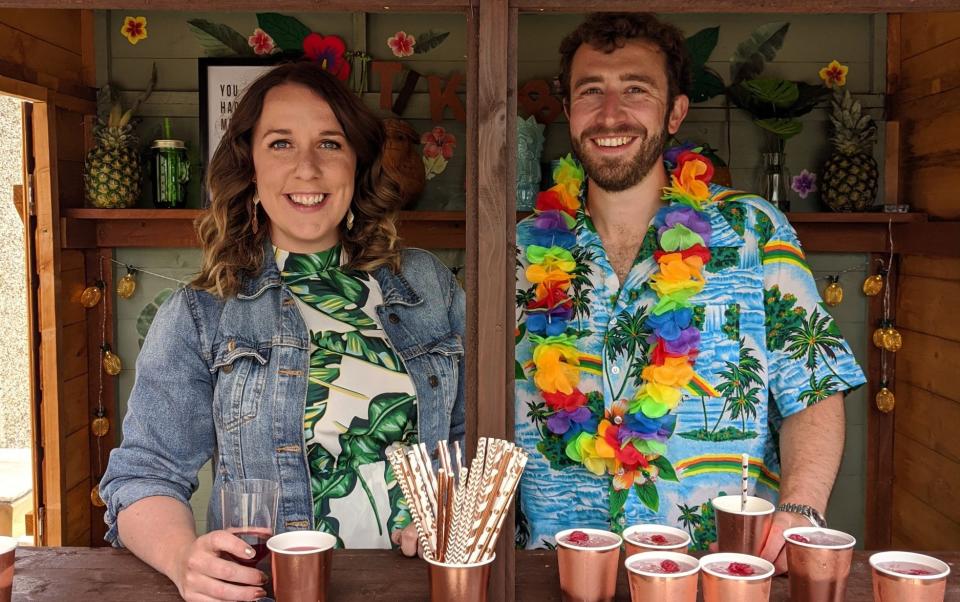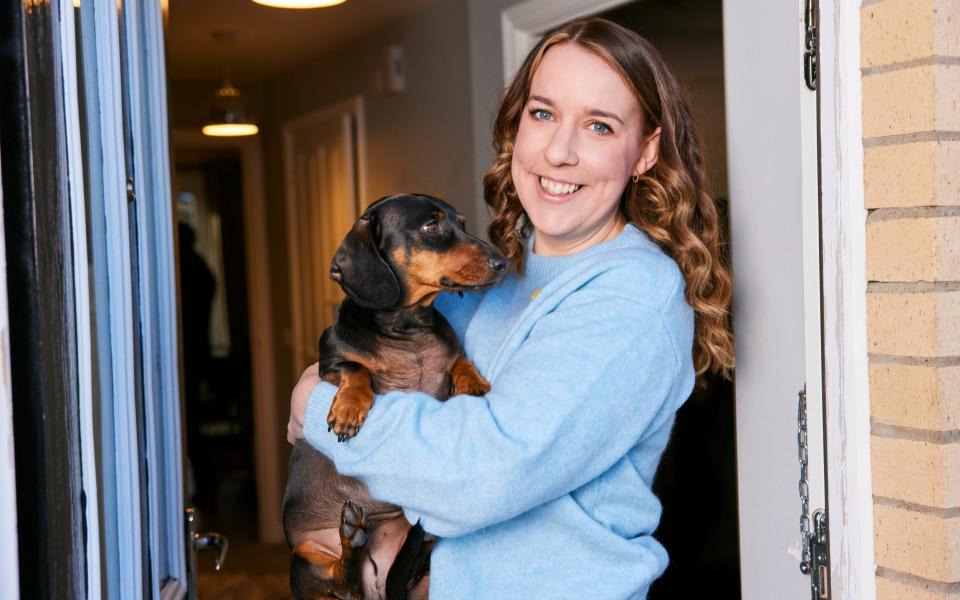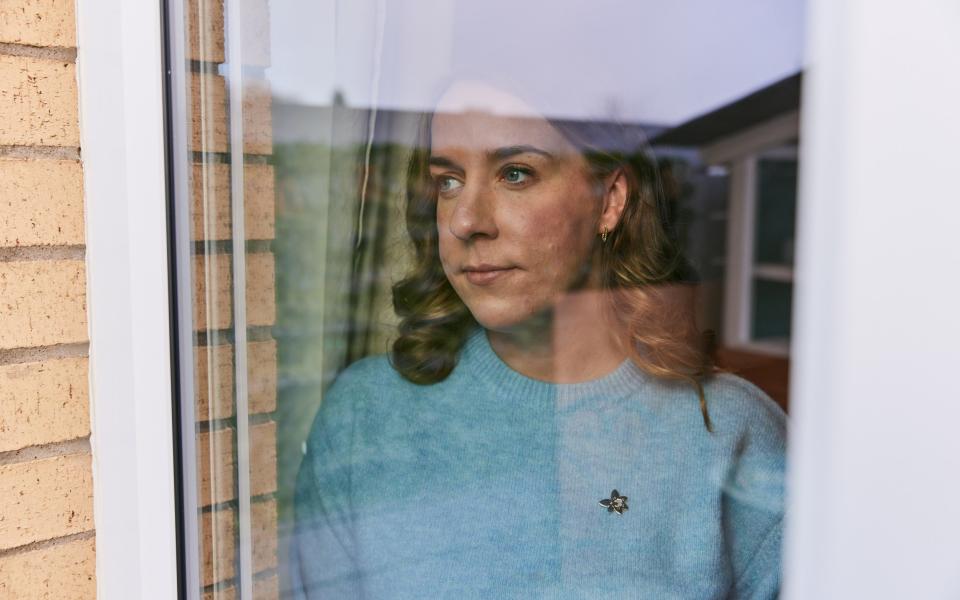“Matt was the manager of our relationship,” Hayley Smith says matter-of-factly. It’s been two years since her husband, Matthew Smith, died of cancer and she’s still grappling with the loose threads of her digital legacy.
“Suddenly you’re asked for every document under the sun when you’re dealing with someone’s death,” says Hayley, now 33, the same age Matthew was when he died in 2021. “And they were all in the emails. by Matt. “
The problem was that after losing her husband, she couldn’t remember his password. She had to guess, changing the numbers until she finally came up with the correct combination.
“And then having to go through all your emails was not a nice feeling,” says the West Lothian charity worker.
The couple had only been married for a year and three months when Matthew, a hedge fund reconciliation manager, was diagnosed with stage 4 glioblastoma in July 2016, at the age of 28.
While he initially responded well to surgery, chemotherapy and radiotherapy, in April 2020 scans showed his tumor had started to grow again and in October 2020 he was told he had a year to live.
Its decline was rapid. Matthew began to suffer clusters of epileptic seizures. His speech was affected and the couple, even if Hayley had thought about it, would have had difficulty fully discussing the details of Matthew’s online presence.
He was eventually admitted to the Marie Curie Hospice in Edinburgh, where he died on 7 October 2021, aged 33..
“Even though I knew Matt was dying, it was never something that crossed my mind. It wasn’t until later that I thought, ‘Oh, great, how do I shut down their social media?’”
It is a problem that did not exist 20 years ago. What will happen to our Facebook, Twitter, Instagram and TikTok accounts when we die? Should we come up with a plan now or risk letting our loved ones make the decision about our digital legacy once we’re gone?


For Hayley, the digital management tsunami was harrowing, although knowing the key to unlocking Matthew’s phone made some things easier. “Everything I had to cancel was very stressful. Many of our joint bills were in his name, our Netflix and even our Nectar card. I had to cancel his phone contract. Many of these places do not know how to talk to a grieving person. I got some pretty annoying phone calls.”
Hayley remembers trying to cancel her contract with Sky, which was in Matthew’s name. “I was explaining to them that I was just a person now and couldn’t pay the bills, but they still kept trying to sell me things.”
The problem with Facebook
Matthew also had investment portfolios and stuff on apps, which Hayley had to untangle. “It took me about a year to sort out most things.” But there’s still one part of her digital legacy that she hasn’t yet taken control of: Matthew’s Facebook page.
“I still haven’t managed to close Matt’s Facebook or turn it into a memories page. I tried 10 times and uploaded his death certificate, but it never changed. I don’t know if there is something wrong with the browser I’m using, but it doesn’t seem to work.
“I just don’t have the energy to chase Facebook. “I’m so busy with work and still processing my grief that I don’t want to have to sit down and communicate with them.” As a result, she often sees annoying messages appear in her feed.
“Some people don’t realize he’s dead. I’ve been on social media quite a bit, but there are some people who haven’t been on it for a long time and still write “Happy Birthday” to you. “You see that pop up and it’s just horrible.”
Her experience of losing Matthew has made her think about her own digital legacy. Hayley has appointed her two sisters as her guardians and even has a folder at work that says “If Hayley Gets Hit by a Bus.”
He recommends that more people think about passing on information about their digital life to their family or partner, so they can read it in the event of a sudden death.


“We don’t want the worst to happen to ourselves, but we just don’t know what’s going to happen. It’s terrible to think about, but it’s necessary. It makes everyone’s life easier if you suddenly become unable to make decisions for yourself.”
Sarah Stanley is a Marie Curie nurse and an expert on digital legacy issues for the charity. She says: “When you think about digital legacy, people tend to think directly of social media, but in reality our mobile phones contain a lot of information about us. Now they are also our chambers, and we keep in them so many things that we can lose when we die.”
He has first-hand experience of how distressing a locked phone can be, after losing two families during the Covid pandemic. “We don’t necessarily print photographs like we used to. Many people also use facial recognition or fingerprint recognition.”
‘Be sure to get fingerprints on your loved ones’
She urges everyone to consider how they could ensure their own family memories are not lost. “It could be going through the photos on your phone and making sure you get prints from some of your loved ones.”
Digital legacy is something Marie Curie talks about more and more with the people she supports. Among the questions they ask people to consider are whether they want their friends and family to have access to their photos or posts after they die, whether they should have important documents saved in their email folders that others may need, and whether there are Private information. information that they do not want their family or friends to access.
“The conversation is moving and growing rapidly,” Stanley says. “And it’s something we need to start thinking about a lot more.”


The first step is to make a plan for all the different online accounts you have. When it comes to social media, knowing your options is important. Do you want to memorialize an account so your friends can see your timeline and photos, but no one can make changes?
It is also possible to set up a legacy contact on Facebook – a person with the power to manage your account but without the ability to create new posts or read your messages. You may prefer to disable it or delete it more permanently so that its content is no longer available. While for the person who is dying it may be the last thing on their mind, it helps those left behind to think about it and, if possible, talk about what their wishes would be.
“The things you end up doing after someone dies are incredibly stressful. All the responsibility falls on you, which is really difficult,” says Hayley. She says Marie Curie has been a great support, both during Matthew’s illness and since.
It was not until July 2021 that Hayley was referred to Marie Curie. Before that, she had been caring for Matthew alone at home while she continued working. Marie Curie organized day and night visits and put her in touch with her local palliative care services, with which she had not until then been in contact. The support she and Matthew received inspired Hayley to start working at a children’s hospice in Scotland.
“I don’t know where I would be without Marie Curie, they have been phenomenal,” he says. “Everyone processes grief very differently, but talking about digital legacy and making a plan today means you can save your loved ones from grief when you are gone.”
Marie Curie is one of four charities supported by this year’s Telegraph Christmas Charity Appeal. The others are Go Beyond, Race Against Dementia and the RAF Benevolent Fund. To make a donation, visit telegraph.co.uk/2023appeal or call 0151 284 1927